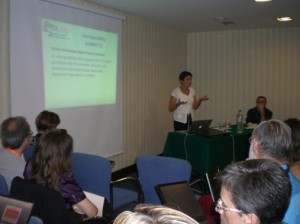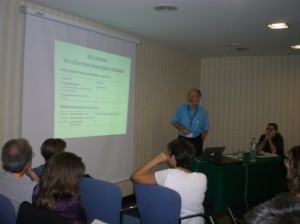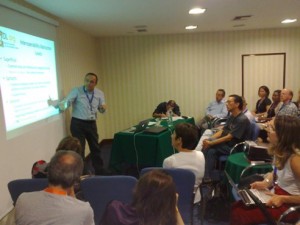Corfu, Greece – 1 October 2009: Morning Session – Content, Functionality and User Interoperability
The morning session continued with three talks on DL.org’s approach to interoperability from the perspective of content, functionality and user.

Donatella Castelli, Content Interoperability
Donatella Castelli (CNR-ISTI), DL.org co-ordinator, described the mission and scope of the Content Working Group , placing emphasis on specific interoperability problems in this domain, such as:
- Information objects, abstraction levels, metadata.
- A subset of information objects that characterize aspects related to common interoperability issues encompass: information object attributes, format, context, provenance, and identifier.
This WG is currently developing a comprehensive interoperability framework that captures the multi-faceted nature of interoperability issues and solutions, as well as evaluating existing approaches and solutions.
Dagobert Soergel, University at Buffalo, presented the main objectives of DL.org’s Functionality Working Group with special reference to:
- Interoperability use cases, Function Interoperability Framework that the Working Group will produce.
- Scenarios and requirements for interoperability and reuse in the functionality domain.

Dagobert Soergel, Functionality Interoperability
Interoperability issues include Application Programming Interface (API) mismatch, as well as mismatches in programming environments and data formats. The talk also drew attention to the need to set up an environment in which the DL community can produce a database of function descriptions.
The ultimate goal of the Functionality WG is to promote rich functionality over a wide range of
systems with a consistent interface; promote best practices and innovation by educating DL designers, developers, administrators, and users about the rich array of DL functionality. The goal is also to enable finding and reusing software modules that implement desired functionality for developers: reuse existing modules and design for interoperability, for DL managers: implement cutting-edge functionality in configuring a DL system and for users: run a module “on the fly” to accomplish a task. Another goal is to enable federated search.
Yannis Ioannidis, University of Athens, focused his talk on User interoperability, outlining the main goals of the dedicated DL.org Working Group. He explained the meaning of a “DL actor”, which can be an individual, a group of people acting in unison, or as inanimate entities (software programmes and interfaces).

Yannis Ioannidis, User Interoperability
The talk also looked at user modelling, interoperable user models, user profiling, user context, user management, interoperable user management, collaboration, participation and privacy, while also defining the scope of the dedicated Working Group within DL.org in terms of tackling interoperability issues.
Q&A
Functionality:
“In terms of DL specifics, the ultimate goal is about building or creating new functions based on what is already available through a bottom-up approach.” Dagobert Soergel, University at Buffalo.
User:
Q: When it comes to the User concept, what are we dealing with in terms of interoperability?
A: “It has mostly to do with processes, ultimately it will have to use data. Important to bear in mind that there is not always a third person involved and that the rules and ways of exchanging are very different. Resolving the issue on an interoperability level is not enough because we need to establish how users can interact with each other. We need to model it. While solutions developed elsewhere may be valuable, it is important to appreciate that we are dealing here with intricate things.“ Yannis Ioannidis, University of Athens.
“Look at other solutions in the ICT domain, on order to understand which ones DL.org could leverage or how it could collaborate. The more useful this is, the better.” Geneva Henry, Rice University, U.S.
Chair: Geneva Henry, Rice University and member of DL.org’s External Advisory Board
